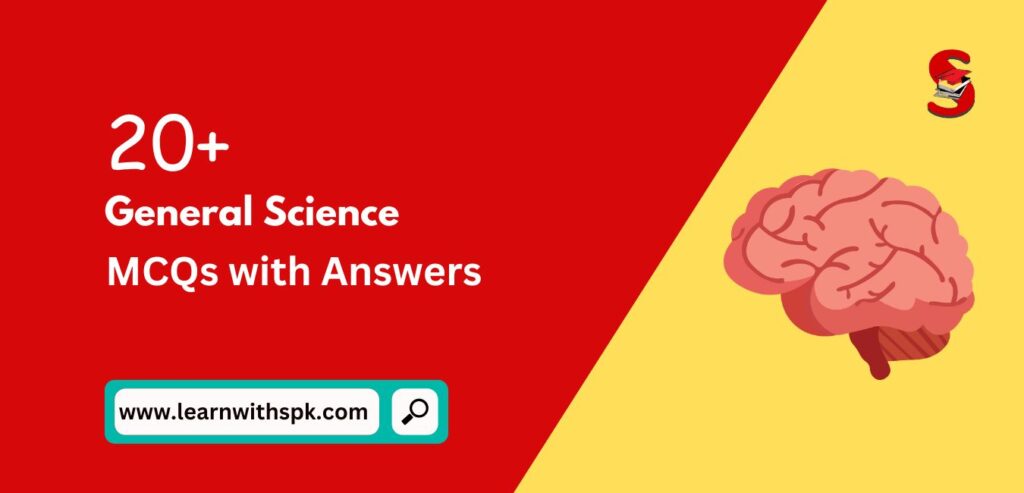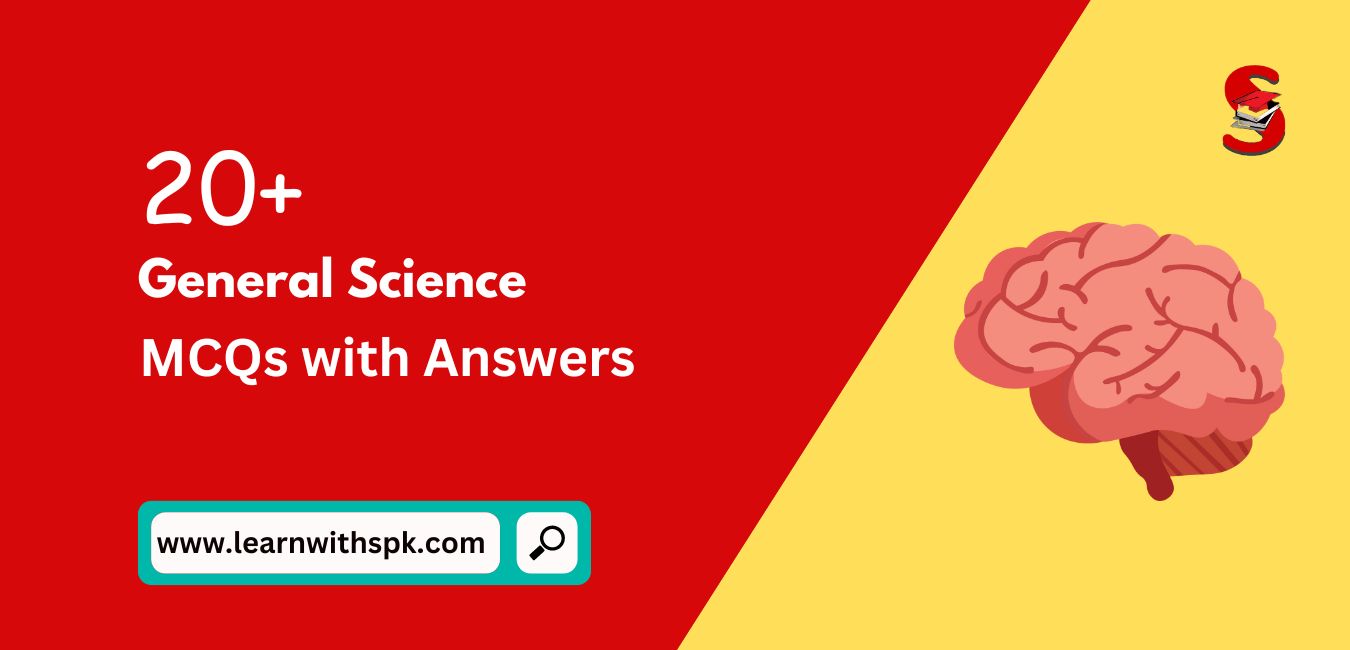In this article, we will have more than 20+ General Science GK MCQ Questions with Answers. These questions will be very helpful to you if you are preparing for any competitive exams like SSC, ADRE, Assam Police, DHS Assam, as well as for the Assam TET GK section. These general science MCQs are available in both English and the Assamese Language.
General Science GK MCQs with Answers for ADRE, Assam Police, DHS Assam
We have given more than 20 most important GK MCQs on General Science for various competitive exams like SSC, Assam Police, DHE Assam, ADRE, etc. These general science MCQs will help you in the general knowledge section of the various government exams.

The 20 most important general Science GK MCQ Questions are given below –
1. Toxicology is study of ___ (বিষ বিজ্ঞানে _____অধ্যয়ন কৰে)
- Adverse effects of chemicals (ৰাসায়নিক পদাৰ্থৰ বিষাক্ত প্রভাব)
- Effects of stars (তৰাৰ প্ৰভাৱ)
- Effect on matel (বিভিন্ন পদাৰ্থৰ প্ৰভাৱ)
- None of these (এটাও নহয়)
[expand title=”View Answer”] (a) Adverse effects of chemicals (ৰাসায়নিক পদাৰ্থৰ বিষাক্ত প্রভাব) [/expand]
2. The hardest substance in the human body is__ (মানৱ দেহৰ সবাতোকৈ কঠিন অংশ ____)
- Keratin (কেৰাটিন)
- Calcium of bone (হাড়ৰ কেলচিয়াম)
- Enamel of teeth (দাঁতৰ এনামেল)
- Phosphorous of skeleton (স্কেলিটনৰ ফছফৰাছ)
[expand title=”View Answer”] (c) Enamel of teeth (দাঁতৰ এনামেল) [/expand]
3. Which Indian scientist has got a Nobel Prize for his contribution in physics? (পদার্থ বিজ্ঞানলৈ আগবঢ়োৱা অৱদানৰ বাবে ভাৰতৰ কোনজন বিজ্ঞানীয়ে নোবেল বঁটা লাভ কৰিছে?)
- Meghnad Saha (মেঘনাদ সাহা)
- Homi Jahangir Bhaba (হোমি জাহাংগীৰ ভাবা)
- Jagdish Basu (জগদীশ বসু)
- Hargovind Khurana (হৰগোবিন্দ খোৰানা)
[expand title=”View Answer”] (b) Homi Jahangir Bhaba (হোমি জাহাংগীৰ ভাবা) [/expand]
4. The group of animals similar to fish in reproduction are _____ (মাছৰ দৰে একে ধৰণে প্ৰজনন কৰা প্ৰাণীৰ গোটটো হ’ল ______)
- Frogs (ভেকুলী)
- Lizards (জেঠী)
- Snakes (সাপ)
- Birds (চৰাই)
[expand title=”View Answer”] (a) Frogs (ভেকুলী) [/expand]
5. The organ that helps us to recall and analyse is ____ (মনত পেলোৱা আৰু বিশ্লেষণ কৰাত সহায় কৰা অংগটো হ’ল ____)
- Muscle (পেশী)
- Brain (মগজু)
- Spinal Cord (মেৰুদণ্ড)
- Nerve (স্নায়ু)
[expand title=”View Answer”] (b) Brain (মগজু) [/expand]
6. In a food chain, generally maximum numbers are of _________. (খাদ্য শৃংখল এটাত, সাধাৰণতে সৰ্বাধিক সংখ্যা হয় _________)
- Producers (উৎপাাদক)
- Primary Consumers (প্রাথমিক উপভোক্তা)
- Secondary Consumers (দ্বিতীয়ক উপভোক্তা)
- Tertiary Consumers (তৃতীয়ক উপভোক্তা)
[expand title=”View Answer”] (a) Producers (উৎপাাদক) [/expand]
7. The combination of which of the following soils is best for plant growth (উদ্ভিদৰ বিকাশৰ বাবে তলৰ কোনটো মাটিৰ সংমিশ্রণ উৎকৃষ্ট?)
- Clay, Sand and Gravel (বোকা, বালি আৰু শিল)
- Humus, Clay and Gravel (পলস, বোকা আৰু শিল)
- Sand, Humus and Gravel (বালি, পলস আৰু শিল)
- Humus, Sand and Clay (পলস, বালি আৰু বোকা)
[expand title=”View Answer”] (d) Humus, Sand and Clay (পলস, বালি আৰু বোকা) [/expand]
8. In spring which of the following occurs? (বসন্ত কালত তলৰ কোনটো পৰিঘটনা ঘটে?)
- The days are longer and nights are shorter (দিনবোৰ দীঘল আৰু ৰাতিবোৰ চুটি হয়)
- The nights are longer and days are shorter (ৰাতিবোৰ দীঘল আৰু দিনবোৰ চুটি হয়)
- Days and nights are of almost equal duration (দিন আৰু ৰাতি প্রায় সমান হয়)
- None of the above (ওপৰৰ এটাও নহয়)
[expand title=”View Answer”] (c) Days and nights are of almost equal duration (দিন আৰু ৰাতি প্রায় সমান হয়) [/expand]
9. Which of the following plays an important role in the cause of rainfall? (বৰষুণ হোৱাৰ ক্ষেত্ৰত তলৰ কোনটোৱে গুৰুত্বপূৰ্ণ ভূমিকা পালন কৰে?)
- Evaporation (বাষ্পীভবন)
- Condensation (ঘনীভবন)
- Both evaporation & condensation (বাষ্পীভৱন আৰু ঘনীভৱন দুয়োটা)
- Filtration (পৰিস্ৰাৱন)
[expand title=”View Answer”] (c) Both evaporation & condensation (বাষ্পীভৱন আৰু ঘনীভৱন দুয়োটা) [/expand]
10. Non-green plants like mushroom can’t make their own food because _____ (কাঠফুলাৰ দৰে অসেউজ উদ্ভিদে সিহঁতৰ নিজৰ খাদ্য নিজে প্রস্তুত কৰিব নোৱাৰে কাৰণ_____)
- They are too small (সিহঁত বহুত সৰু)
- They lack chlorophyll (সিহঁতৰ পত্ৰহৰিৎ নাই)
- They lack photo-tropism (সিহঁতৰ আলোকানুবর্তিতাৰ অভাৱ)
- They lack roots to suck water (পানী শুহিবলৈ সিহঁতৰ শিপা নাই)
[expand title=”View Answer”] (b) They lack chlorophyll (সিহঁতৰ পত্ৰহৰিৎ নাই) [/expand]
11. Most of the reptiles like snakes, crocodiles, etc. eat their food by ______(বেছিভাগ সৰীসৃপ প্রাণী যেনে: সাপ, ঘৰিয়াল আদিয়ে সিহঁতৰ খাদ্য খায় ______)
- Tearing its flesh (মাংস ছিঙি)
- A process called cud chewing (পাগুলি খোৱা প্ৰক্ৰিয়াৰ দ্বাৰা)
- Swallowing it as a whole (গোটে গোটে গিলি)
- Sucking its blood (তেজ শুহি)
[expand title=”View Answer”] (c) Swallowing it as a whole (গোটে গোটে গিলি) [/expand]
12. Which of o the following is not a part of the excretory system? (তলৰ কোনটো ৰেচন ক্ৰিয়াৰ অংশ নহয়?)
- Eyes (চকু)
- Lungs (হাঁওফাঁও)
- Kidneys (বৃক্ক)
- Skin (ছাল)
[expand title=”View Answer”] (a) Eyes (চকু) [/expand]
13. The process of solid changing into liquid upon the supply of heat is called ______(তাপ যোগান ধৰিলে কঠিন পদাৰ্থ তৰল পদাৰ্থলৈ পৰিৱৰ্তন হোৱা প্ৰক্ৰিয়াটোক কোৱা হয় ______)
- Condensation (ঘনীভবন)
- Evaporation (বাষ্পীভবন)
- Melting (গলন)
- Boiling (উতলন)
[expand title=”View Answer”] (c) Melting (গলন) [/expand]
14. When we exhale, our lungs have to _____ (উশাহ এৰি দিলে হাঁওফাঁওটো ______)
- Contract (সংকুচিত হয়)
- Expand (ফুলি উঠে)
- Be still (স্থিৰ হৈ থাকে)
- None of the above (ওপৰৰ এটাও নহয়)
[expand title=”View Answer”] (a) Contract (সংকুচিত হয়) [/expand]
15. Our head is made up of only one movable bone; it is called ______ (আমাৰ মুৰটো কেৱল এডাল অস্থাৱৰ হাড়েৰে গঠিত; ইয়াক কোৱা হয়______)
- Skull (লাওখোলা)
- Cranium (ক্রেনিয়াম)
- Jawbone (হনুহাড়)
- Collarbone (জত্রক)
[expand title=”View Answer”] (a) Skull (লাওখোলা) [/expand]
16. Which of the planets is called the blue planet? (কোনটো গ্রহক নীলা গ্রহবুলি কোৱা হয়?)
- Venus (শুক্র)
- Earth (পৃথিৱী)
- Mars (মঙ্গল)
- Neptune (নেপচুন)
[expand title=”View Answer”] (b) Earth (পৃথিৱী) [/expand]
17. Crackers convert ________ energy to ______ energy (ক্ৰেকাৰে ________ শক্তিক ______ শক্তিলৈ ৰূপান্তৰিত কৰে)
- Heat, light (তাপ, পোহৰ)
- Light, sound (পোহৰ, শব্দ)
- Chemical to sound (ৰাসায়নিক, শব্দ)
- Chemical to electrical (ৰাসায়নিক, বৈদ্যুতিক)
[expand title=”View Answer”] (c) Chemical to sound (ৰাসায়নিক, শব্দ) [/expand]
18. The thermometer that we use to measure body temperature uses which of the following? (শৰীৰৰ উষ্ণতা জোখাৰ বাবে আমি ব্যৱহাৰ কৰা থার্মোমিটাৰটোত তলৰ কোনটো ব্যৱহাৰ কৰা হয়?)
- Silicon (ছিলিকন)
- Mercury (পাৰা)
- Hydrogen (হাইড্রোজেন)
- Oxygen (অক্সিজেন)
[expand title=”View Answer”] (b) Mercury (পাৰা) [/expand]
19. Which bone protects the brain from getting damaged or injured? (কোনডাল হাড়ে মগজুক ক্ষতি বা আঘাতৰ পৰা ৰক্ষা কৰে?)
- Ribcage (কামিহাড়)
- Skull (লাওখোলা)
- Femur (উর্বস্থি)
- Vertebral column (কশেৰুকা/ৰাজহাড়)
[expand title=”View Answer”] (b) Skull (লাওখোলা) [/expand]
20. X-rays can _____ (এক্স-ৰে’ _______)
- Pass through our skin (আমাৰ ছালৰ মাজেৰে পাৰ হৈ যাব পাৰে)
- Pass through our bones (আমাৰ হাড়ৰ মাজেৰে পাৰ হৈ যাব পাৰে)
- Pass through our skin but not bones (আমাৰ ছালৰ মাজেৰে পাৰ হৈ যাব পাৰে কিন্তু হাড়ৰ মাজেৰে নোৱাৰে)
- Pass through our bones but not skin (আমাৰ হাড়ৰ মাজেৰে পাৰ হৈ যাব পাৰে কিন্তু ছালৰ মাজেৰে নোৱাৰে)
[expand title=”View Answer”] (c) Pass through our skin but not bones (আমাৰ ছালৰ মাজেৰে পাৰ হৈ যাব পাৰে কিন্তু হাড়ৰ মাজেৰে নোৱাৰে) [/expand]
21. Red, Blue Violet, Green, Orange & Yellow are six out of the seven colours of a rainbow, what is the seventh one? (ৰামধেনুৰ সাতটা ৰঙৰ ছটা হ’ল ৰঙা, নীলা, বেঙুনীয়া, সেউজীয়া, কমলা আৰু হালধীয়া; সপ্তমটো কি?)
- Purple (বেঙুনীয়া)
- Pink (গুলপীয়া)
- Brown (মৃগা)
- Indigo (ঘন নীলা)
[expand title=”View Answer”] (d) Indigo (ঘন নীলা) [/expand]
Suggested Video for 20+ General Science GK MCQ Questions
To help you better understand the above General Science MCQ Questions, we suggest you watch the complete video which is attached below.
This video will help you to clear your doubts and a better understanding of the General science GK MCQ Questions that we have discussed.

Good work sir…